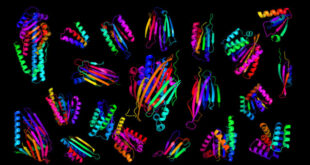A group of researchers from Emory University in the United States and Lancaster University and the University of Leeds, both in the UK, has discovered that epigallocatechin-3-gallate (EGCG), a compound found in green tea leaves, breaks up and dissolves potentially dangerous protein plaques found in the blood vessels.
Green tea leaves. Image credit: S.X.H.
Atherosclerosis is the build-up of fatty material inside our arteries that can reduce the flow of blood to the heart and brain.
In advanced stages of the condition, a protein called apolipoprotein A-1 (apoA-1) can form amyloid deposits, which are similar in structure to those associated with Alzheimer’s disease.
These deposits build up within atherosclerotic plaques. They increase the size of the plaques, further restricting blood flow, and may also make the plaques less stable, increasing the risk of a heart attack or stroke.
Lancaster University’s Professor David Middleton and co-authors found that EGCG binds to the amyloid fibers of apoA-1. This converts the fibers to smaller soluble molecules that are less likely to be damaging to blood vessels.
Now, the scientists are working on finding ways of introducing effective amounts of EGCG into the bloodstream without it being necessary to drink large and potentially harmful quantities of green tea.
This could involve modifying the chemical structure of EGCG, making it easier to be absorbed from the stomach and more resistant to metabolism, or developing new methods to deliver the molecule to the plaques — such as via an injection.
“The health benefits of green tea have been widely promoted and it has been known for some time that EGCG can alter the structures of amyloid plaques associated with Alzheimer’s disease,” Professor Middleton said.
“Our results show that this intriguing compound might also be effective against the types of plaques which can cause heart attacks and strokes.”
“Our bodies are very good at breaking down EGCG so swapping your cuppa for green tea is unlikely to make a big difference with respect to your heart health,” said Professor Jeremy Pearson, Associate Medical Director at the British Heart Foundation who was not involved in the study.
“But by engineering the molecule slightly, we might be able to make new medicines to treat heart attack and stroke.”
“The findings of this round of studies are very encouraging,” said co-author Professor Sheena Radford, Director of the Astbury Centre for Structural Molecular Biology at the University of Leeds.
“We now need to apply the best scientific techniques to find how we can take the molecular EGCG element from green tea, and turn it into a functioning tool to combat life-limiting health issues.”
The findings were published online May 31, 2018 in the Journal of Biological Chemistry.
_____
David Townsend et al. Epigallocatechin-3-gallate remodels apolipoprotein A-I amyloid fibrils into soluble oligomers in the presence of heparin. Journal of Biological Chemistry, published online May 31, 2018; doi: 10.1074/jbc.RA118.002038
 #Bizwhiznetwork.com Innovation ΛI |Technology News
#Bizwhiznetwork.com Innovation ΛI |Technology News




